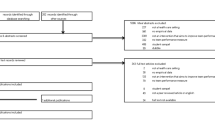Abstract
Team leaders are expected to adequately analyse team conflicts. Both content and analytical depth of cognitive processes determine team leaders’ performance and are assumed to differ with level of expertise. A study is reported in which team leaders at four different levels of expertise (novices, semi-experts, experts, mediators) were compared in their analysis of a team conflict presented in a computer-based simulation. Few differences were found between novices and semi-experts, whereas team leaders and mediators differed both in content and in analytical depth of cognitive processes. It is not the amount of practice time itself, which substantially impacts the content and depth of team leaders’ analyses of conflicts. Rather the quality of experience is crucial for developing the ability to conduct an elaborated analysis of team conflicts.
Similar content being viewed by others
References
Allen, N. J., & Hecht, T. D. (2004). The “romance of teams”: Toward an understanding of its psychological underpinnings and implications. Journal of Occupational and Organizational Psychology, 77, 439–461.
Boshuizen, H. P. A., & Schmidt, H. G. (1992). On the role of biomedical knowledge in clinical reasoning by experts, intermediates and novices. Cognitive Science, 16, 153–184.
Cohen, S. G., & Bailey, D. E. (1997). What makes teams work: group effectiveness research from the shop floor to the executive suite. Journal of Management, 23, 152–162.
Desivilya, H. S., & Eizen, D. (2005). Conflict management in work teams: the role of social self-efficacy and group identification. The International Journal of Conflict Management, 16, 183–208.
Eden, D. (1990). Pygmalion without interpersonal contrast effects: whole groups gain from raising manager expectations. Journal of Applied Psychology, 75, 394–398.
Ericsson, K. A. (2006). The influence of experience and deliberate practice on the development of superior expert performance. In K. A. Ericsson, N. Charness, P. J. Feltovich, & R. R. Hoffman (Eds.), The Cambridge handbook of expertise and expert performance (pp. 683–703). Cambridge: Cambridge University Press.
Ericsson, K. A., Roring, R. W., & Nandagopal, K. (2007). Giftedness and evidence for reproducibly superior performance: an account based on the expert performance framework. High Ability Studies, 18, 3–56.
Evans, K., Hodkinson, P., Rainbird, H., & Unwin, L. (2006). Improving workplace learning. London: Routledge.
Feltovich, P. J., Prietula, M. J., & Ericsson, K. A. (2006). Studies of expertise from psychological perspectives. In K. A. Ericsson, N. Charness, P. J. Feltovich, & R. R. Hoffman (Eds.), The Cambridge handbook of expertise and expert performance (pp. 41–67). Cambridge: Cambridge University Press.
George, J. M., & Bettenhausen, K. (1990). Understanding prosocial behaviour, sales, performance, and turnover: a group-level analysis in a service context. Journal of Applied Psychology, 75, 698–709.
Gruber, H., Lehtinen, E., Palonen, T., & Degner, S. (2008). Persons in the shadow: Assessing the social context of high abilities. Psychology Science Quarterly, 50, 237–258.
Hodkinson, P., Biesta, G., & James, D. (2008). Understanding learning culturally: overcoming the dualism between social and individual views of learning. Vocations and Learning: Studies in Vocational and Professional Education, 1, 27–47.
Jehn, K. A. (1995). A multimethod examination of the benefits and determinants of intragroup conflict. Administrative Science Quarterly, 40, 256–282.
Jones, G. R. (2004). Organizational theory, design, and change (4th ed.). Upper Saddle River: Prentice Hall.
Keyton, J., & Beck, S. J. (2008). Team attributes, processes, and values: a pedagogical framework. Business Communication Quarterly, 71, 488–504.
Kotlyar, I., & Karakowsky, L. (2006). Leading conflict? Linkages between leader behaviours and group conflict. Small Group Research, 37, 377–403.
McDonough, E. F., & Barczak, G. (1992). The effects of cognitive problem-solving orientation and technological familiarity on faster new product development. Journal of Product Innovation Management, 9, 44–52.
Rousseau, V., Aubé, C., & Savoie, A. (2006). Teamwork behaviours. A review and an integration of frameworks. Small Group Research, 37, 540–570.
Savage, G. T., & Hilton, C. B. (2001). A critical view of facilitating labor-management collaboration. Group Facilitation: A Research and Applications Journal, 3, 46–55.
Strasser, J., & Gruber, H. (2007). Expertise and counselors´ conceptual skills. Paper presented at the 88th Annual Meeting of the American Educational Research Association (AERA), Chicago, USA. April
Tuckman, B. W. (1965). Developmental sequence in small groups. Psychological Bulletin, 63, 384–399.
Van den Bossche, P., Segers, M., & Kirschner, P. (2006). Social and cognitive factors driving teamwork in collaborative learning environments. Small Group Research, 37, 490–521.
Wall, J. A., & Callister, R. R. (1995). Conflict and its management. Journal of Management, 21, 515–558.
Author information
Authors and Affiliations
Corresponding author
Rights and permissions
About this article
Cite this article
Rupprecht, M., Strasser, J., Gruber, H. et al. Expertise of Team Leaders in Analysing Team Conflicts. Vocations and Learning 3, 39–54 (2010). https://doi.org/10.1007/s12186-009-9029-2
Received:
Accepted:
Published:
Issue Date:
DOI: https://doi.org/10.1007/s12186-009-9029-2




